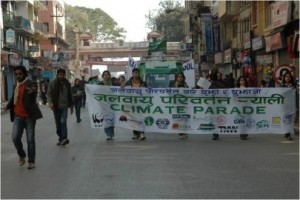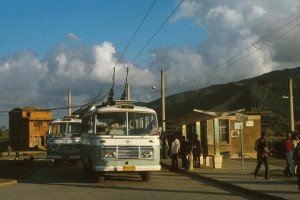Global Climate Change talks and the process of constitution making in Nepal has several similarities. The agreement made in Bali, Indonesia (resulting in the Bali Action Plan) and the provision in the Interim Constitution of Nepal. Both the processes had similar mandates – two years for drafting a new agreement respectively on a fair, ambitious and binding outcome under the UNFCCC / a fair Constitution for the Nepali people. Both were delayed, brushing aside the high expectations and with very little hope for meeting timelines, one more year has been added for both discourses as we found to our dismay at the beginning of this year. Lack of trust among the countries in the Climate Change discussions and among Nepali political parties engaged in the drafting of the Constitution is hampering  the negotiations on both ends, and there’s little hope that the negotiations/drafting will be complete within the revised-time frame. In this whole process, we, the Nepali Civil Society, are getting to see both the painful processes very closely.
the negotiations on both ends, and there’s little hope that the negotiations/drafting will be complete within the revised-time frame. In this whole process, we, the Nepali Civil Society, are getting to see both the painful processes very closely.
Climate Change discussions peaked gradually after COP 13 held in Bali, Indonesia. Parties adopted the Bali Road Map as a two-year process to finalize a legally binding agreement in 2009 in Copenhagen. The Bali Road Map decided to establish subsidiary bodies under the Convention to conduct the process- the Ad Hoc Working Group on Long-term Cooperative Action (AWG-LCA) and the Ad Hoc Working Group on Further Commitments for Annex I Parties under the Kyoto Protocol (AWG-KP) – that were to complete their work in 2009 and present the outcome to the Conference of Parties at its 15th session in Copenhagen. Ending with a weak political statement, the Copenhagen Conference was not successful and failed to meet our expectations. The parties were not able to remove the brackets (undecided issue within parties) from the draft text of Ad-hoc working groups; this resulted in the working groups being given extended mandates until Cancun, Mexico (COP 16) at the end of 2010.
The Nepalese Constituent Assembly is a body of 601 members formed as a result of the Constituent Assembly election on April 10, 2008. At the first session of the Constituent Assembly on 28 May, it voted to declare Nepal a Federal Democratic Republic, thereby abolishing the monarchy. Besides this, the newly elected jumbo body is receiving criticism on several fronts : lack of evidence about real work done to the public, the excessive expenses that are inflating the budget of the country towards its upkeep and alleged charges of corruption amongst members of the Assembly.
It is clear that the main reason for the failure to nail down a final agreement is a lack of political commitment endemic to both the discourses. At the Nepali Constitution Assembly front, members have not been able to move ahead with the constitution writing process and within the international climate discourse, member states clearly lack high level commitment to further the climate talks, thus the negotiations have failed to ratchet up its pace, and so has the constitution writing process. The priority at present should be the peace process and constitution making in Nepal. However, the parties are giving too much emphasis on who should lead the government, which shows the misplaced priority of the parties. By making the peace process and constitution writing their priority, the parties need to work collectively to write the new constitution and complete the peace process.
To contrast both a little, Climate change discussion at this moment seems quite progressive, as compared to discussions within parties here in Nepal. While the political powers seem to have forgotten the main issue and focus on getting their hands on the prime ministerial lollypop – the climate change discussion is moving ahead under the leadership of Christiana Figueres the new Executive Secretary of UNFCCC.
The extra year derived from the extension of the tenure of the Constituent Assembly in Nepal and the time frame between Copenhagen and Cancun is an opportunity for the political parties of Nepal and world leaders to create yet another milestone worth making Nepalese proud, both at home and abroad. We really hope that the leaders will make the best use of this opportunity for the advancement and welfare of this nation. Likewise we the people of Nepal hope that the International community and world leaders will make us all proud by agreeing to a international agreement on climate change that will be fair, ambitious, equitable and stem the tide of a changing climate before it is too late.



